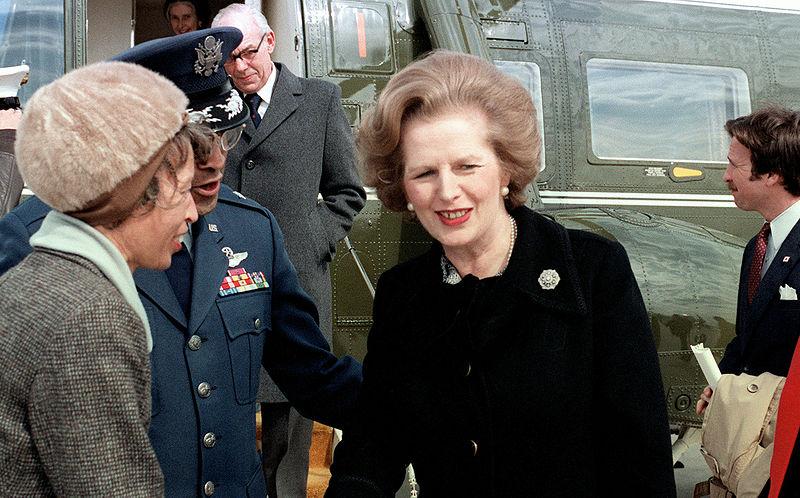 The 2014 Madeleine Award for the use of symbol, stunt, prop, gesture or jest in international affairs goes to Margaret Thatcher.
The 2014 Madeleine Award for the use of symbol, stunt, prop, gesture or jest in international affairs goes to Margaret Thatcher.
Some winners just stand up and demand the prize through sheer force of personality and performance. Thatcher was such a performer. The previous column set out the principles of the Madeleine Award, drawing on the inventive signalling and gesture work of Madeleine Albright through the brooches she wore when meeting other leaders.
The former US Secretary of State and UN Ambassador offers us some fine words from her own experience that apply equally as well to Margaret Thatcher. These are the closing words of Albright’s autobiography:
I hope that people will say that I did the best with what I was given, tried to make my parents proud, served my country with all the energy I had, and took a strong stand on the side of freedom. Perhaps some will also say that I helped teach a generation of older women to stand tall and young women not to be afraid to interrupt.
Margaret Thatcher did more than interrupt. She took over the whole conversation in lots of different ways, both small and large.
In writing the citation for Thatcher’s award, start with the hair. The British National Archives has just released the Thatcher appointments diary, and we now know that the PM had her hair styled 120 times in 1984—an average of once every three days. During the London economic summit there was a hair-check on five consecutive days.
Thatcher had a lock on the look-of-the-locks law long before Hillary Clinton gave her ‘hair matters’ advice to Yale University students in 2001. Here is Hillary at her dry, wry, deadpan best:
The most important thing I have to say to you today is that hair matters. This is a life lesson my family did not teach me, Wellesley and Yale Law School failed to instill: Your hair will send significant messages to those around you. What hopes and dreams you have for the world, but more, what hopes and dreams you have for your hair. Pay attention to your hair, because everyone else will.
Margaret and Hillary could agree, at least, on hair: the tresses always talk but must not dominate the conversation.
The Madeleine is an award for effort in the international arena and Thatcher could be a difficult fit on this stage. When she took the leadership, one less-than-impressed Tory MP, Jonathan Aitken, wisecracked that her ignorance of foreign affairs was such that she thought Sinai was the plural of sinuses. Thatcher became a formidable force in the foreign policy realm but she always distrusted the established players.
Thatcher often viewed her Foreign Office as the enemy—not ‘one of us’ but actually ‘one of them’, on everything from Europe to the US alliance. The Thatcher perspective on her diplomats is beautifully captured by one of Ulster’s finest journalistic exports, John Cole, in his memoirs:
Margaret Thatcher’s suspicions about the Foreign Office are legendary, though they have not always resulted in any very effective control of its policies. At times she seemed to regard it as a free-standing institution, independent of government. South Africa provided one example given to me. She had been persuaded, reluctantly, that British military attaches ought to be withdrawn. Sometime later, a Foreign Office minister, accompanying her at a meeting with an African statesman who complained about Britain’s record in opposing apartheid, was astonished by the reply. First she ticked off what had been done: the Gleneagles agreement, no arms sales, and so on. Then turning to the FO man, she added: ‘And they’ve withdrawn military attaches, whatever good that may do.
Margaret Thatcher was a woman and a leader who would be most considerate of the tea lady while doing fierce damage to the Foreign Secretary. Here is the evidence from her former speechwriter and political adviser, John O’Sullivan:
Mrs Thatcher reversed the usual etiquette of political praise. She kicked up and she kissed down. The ladies who served tea, the doormen, her beloved detectives could do no wrong; her ministers and senior civil servants must have sometimes felt they could do no right. An example of this was when a waitress at Chequers stumbled and poured soup into the lap of the Foreign Secretary. Mrs Thatcher jumped up and comforted the waitress!
Now there’s an interesting leader’s code: Comfort the waitress, afflict the Foreign Secretary.
And when the chance comes, never be afraid to take a kick at the President of France! The image comes from Ludovic Kennedy’s account of Mrs T showing his TV crew around 10 Downing Street, after an interview session:
For the next half-hour she took the eight of us on a tour of the public rooms, imparting with impressive assurance the history of this picture or that tapestry, anecdotes of what Pitt had done or Gladstone said. In the state dining-room with its rows of high-backed chairs, she said with a smile: ‘You know I had Giscard here last week. Where do you think I put him?’ We looked suitably baffled. ‘Here,’ she said, indicating a chair, and following her upward glance we saw on the wall opposite a full-length portrait of Lord Nelson next to a full-length portrait of the Duke of Wellington.
Valéry Giscard d’Estaing, French President from 1974 to 1981, had all the habits of a noble (even if his grandfather had adopted a noble moniker rather than inheriting it). And so, Giscard, that noble Frenchman, would have looked up from his soup at Number 10 to see, full-length, the British victors at Trafalgar and Waterloo.
Margaret Thatcher is the worthiest of Madeleine winners.
Graeme Dobell is the ASPI journalism fellow. Image courtesy of US Military, via Wikimedia Commons.